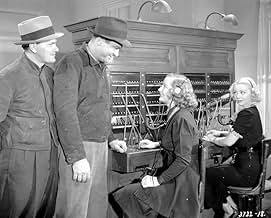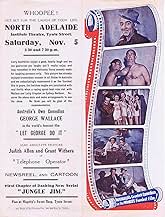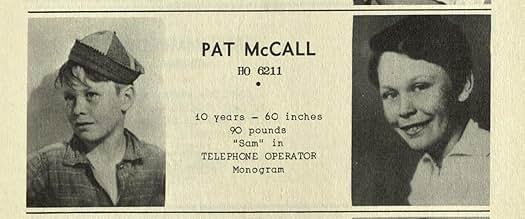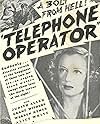Agrega una trama en tu idiomaA telephone operator covering for a friend's "fling" finds herself in the middle of a major disaster when the city is hit by a big flood and her switchboard is the center of communications.A telephone operator covering for a friend's "fling" finds herself in the middle of a major disaster when the city is hit by a big flood and her switchboard is the center of communications.A telephone operator covering for a friend's "fling" finds herself in the middle of a major disaster when the city is hit by a big flood and her switchboard is the center of communications.
- Dirección
- Guionistas
- Elenco
Ronnie Cosby
- Ted Molloy
- (as Ronnie Cosbey)
Dorothy Vaughan
- Mrs. Molloy
- (as Dorothy Vaughn)
Lynton Brent
- Ranger in Radio Cabin
- (sin créditos)
Jack 'Tiny' Lipson
- Counterman
- (sin créditos)
Pat McCall
- Sam
- (sin créditos)
Lafe McKee
- Campbell's Watchman
- (sin créditos)
- Dirección
- Guionistas
- Todo el elenco y el equipo
- Producción, taquilla y más en IMDbPro
Opiniones destacadas
Grant Withers and Warren Hymer are two tough line men for the company. They come to Riverdale, where they set their sights on operators Judith Allen and Alice White.
Given director Scott Pembroke's grounding in comedy -- he was the director of Stan Laurel's burlesques of big hits, like RUPERT OF HEEHAW and DOCTOR PYCKLE AND MISTER PRYDE, you'd think the comedy bits in this early Monogram would be better; well, Miss White is pretty good, but the other actors are rather lugubrious. Until the big finale, it's all tough guys in leather jackets and fedoras pounding on each other, and slow-and-steady progress in the romantic plots.
The big set piece is the flood, and that's handled using stock footage of floods and ranks of telephone operators standing at their boards, while voice-overs tell people "There's a flood. Tell your neighbors." Oh, so that's why the third floor of my house is underwater?
Actually it's a decent movie until that repeated voice-over. Not bad for a Poverty Row Second Feature. Withers is typically fine. t's just that the finale goes on too long.
Given director Scott Pembroke's grounding in comedy -- he was the director of Stan Laurel's burlesques of big hits, like RUPERT OF HEEHAW and DOCTOR PYCKLE AND MISTER PRYDE, you'd think the comedy bits in this early Monogram would be better; well, Miss White is pretty good, but the other actors are rather lugubrious. Until the big finale, it's all tough guys in leather jackets and fedoras pounding on each other, and slow-and-steady progress in the romantic plots.
The big set piece is the flood, and that's handled using stock footage of floods and ranks of telephone operators standing at their boards, while voice-overs tell people "There's a flood. Tell your neighbors." Oh, so that's why the third floor of my house is underwater?
Actually it's a decent movie until that repeated voice-over. Not bad for a Poverty Row Second Feature. Withers is typically fine. t's just that the finale goes on too long.
Given this movie's solid rating, it obviously strikes a chord with those who see it, which means that I obviously missed something. Certainly, the movie gives a taste of the importance of telephone communication in the era. As Helen (the Operator) repeatedly spread news of the disaster as she connects with person after person ("the Riverdale dam is out!" over and over again) it reminded me a little bit of a primitive version of Twitter. The technical quality wasn't bad (although the version I saw was, I believe, heavily edited) and the scenes portraying the rising flood waters in town were pretty realistic (although the shots of the bursting of the dam itself seemed less so.) But still - aside from the basic soap opera like story of Helen trying to cover up her boss's wife's affair - the reality is that nothing much of interest (aside from a couple of pretty well staged fight scenes) happens until the last 10- 15 minutes of the movie when the dam finally goes, although in the end one has to appreciate the irony of the three heroes also being the three who got fired earlier in the film. 3/10
This movie highlights the efforts of telephone operators in warning people when the Riverdale Dam breaks. Withers and Hymer play two linesmen (the best there ever were as they tell everybody) were sent to the town to string more lines by the dam. I disliked this movie almost from the beginning and finished watching it only to see if I could revise my early opinion. Another reviewer refers to the chronic sexual harassment in the movie and that it might ruffle a few feathers. The arrogant, overbearing lout played by Withers is thoroughly obnoxious. Early in the movie at a dance, Withers grabs Judith Allen who cries out in pain and asks him to let her go. He won't until another man comes along (who Withers ends up socking - what a guy). Evidently this abusive behavior was acceptable in the 1930s, so the audience would not have been surprised that Withers and Allen end up falling in love and saving the day. There were two good things about this movie, 1) the cute kid and 2) the flood footage. Oh, there's a third good thing – many minutes of this film are missing and it's now only 53 minutes long.
The version I downloaded from the Internet Archive must be heavily cut, as it's only 53m. Despite this inexcusable decimation, I found this flick to be quite satisfying, for what it is. We've got cocksure telephone linesmen, surly switchboard operators, kids with shortwave radios, a failing dam, and a terrific flood - 30's style, and stuffed into little more than an hour! The cast are all sufficiently capable in their roles, particularly leads Allen and Withers, but it was the colorful details that really sustained my interest. Things like Helen's kid brother setting his alarm for 5 so he can listen to a Boy Scout rally from England on the shortwave. The film is a nifty little time capsule of the 1930's telecommunications industry at work, and its importance to daily life in that decade.
Whatever morals, standards, conventions existed before WW2 (see other review), this story is sweet and nostalgiac. Those days when telephone operators and switchboards were the latest in technology are shown for us to visit past times and lifestyles. The wardrobe and dance scenes are lovely. The acting is excellent. Characters who may at first seem sketchy and self-serving are challenged to step up to the plate and choose to do the right when called up, Their character transformation and growth in relationships is fulfilling and the ending is happy!
Not too heavy nor scary but some tense times. Some comedy and some romance. Delightful.
Not too heavy nor scary but some tense times. Some comedy and some romance. Delightful.
¿Sabías que…?
- TriviaThe earliest documented telecast of this film took place in New York City Friday 5 May 1950 on the Night Owl Theatre on WPIX (Channel 11).
Selecciones populares
Inicia sesión para calificar y agrega a la lista de videos para obtener recomendaciones personalizadas
Detalles
- Tiempo de ejecución1 hora 10 minutos
- Color
- Relación de aspecto
- 1.37 : 1
Contribuir a esta página
Sugiere una edición o agrega el contenido que falta

Principales brechas de datos
By what name was Telephone Operator (1937) officially released in Canada in English?
Responda




























